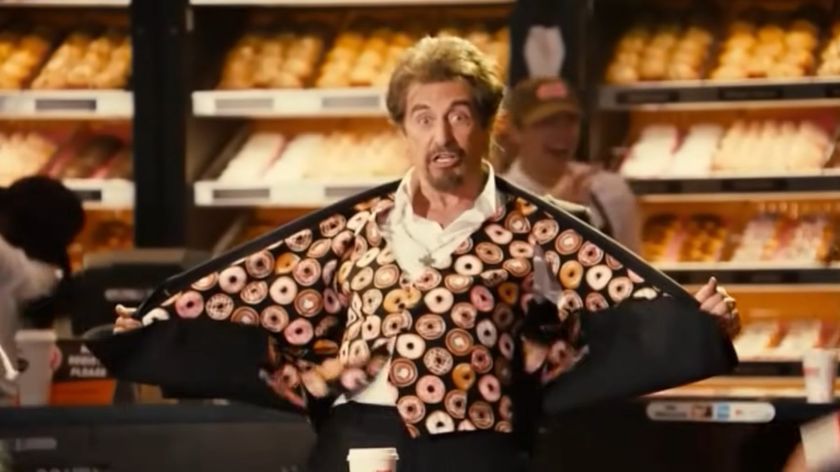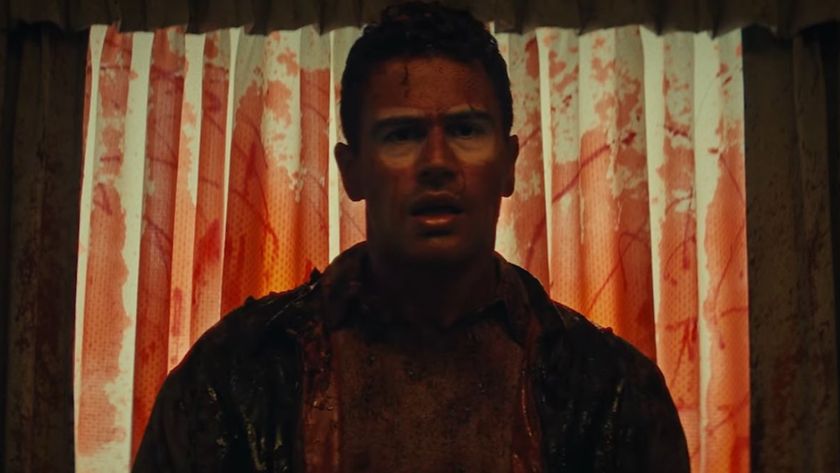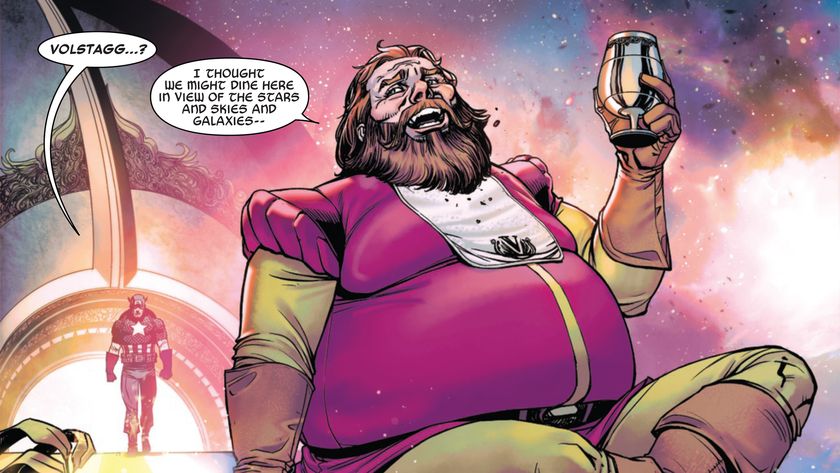Bus Stop at 65: The movie that changed Marilyn Monroe's career forever
A look back at Bus Stop, the Marilyn Monroe movie that broke the mold
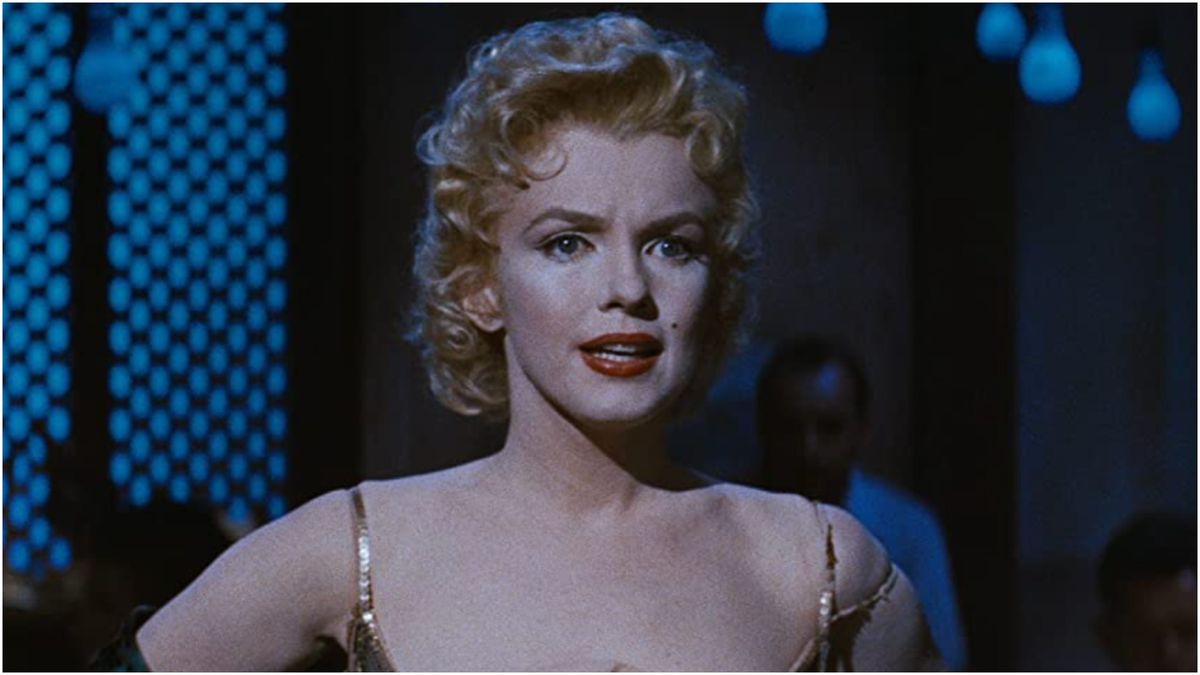
Picture Marilyn Monroe and you'll see platinum blonde hair, bright red lipstick, and a white dress fluttering over a subway grate. But right after immortalizing exactly that image in 1955's The Seven Year Itch, Monroe reinvented herself. Under her own company, Marilyn Monroe Productions, and with a new studio contract under her belt, the actor delivered what remains one of her best performances, in a movie you've likely never heard of: Bus Stop.
The film, penned by The Seven Year Itch co-writer George Axelrod and directed by Joshua Logan, is based on a William Inge play. It follows Beau Decker (Don Murray), a bad mannered and rambunctious cowboy who's never left his ranch before. He sets out by bus from Montana to Arizona in the hopes of winning a rodeo – and bagging himself a woman. When he sees Monroe's Chérie performing at a bar, he's immediately smitten, and decides they'll be married the very next day. No matter how often Chérie turns him down or tries to escape, Beau won't be deterred, and she is eventually won over at the film's titular bus stop on their way back to Montana.
Today, Bus Stop is more a horror film than a rom-com (at one point, Beau literally lassoes Chérie as she tries to flee), but Monroe makes it worth remembering on the 65th anniversary of its premiere.
"People have scope, you know"
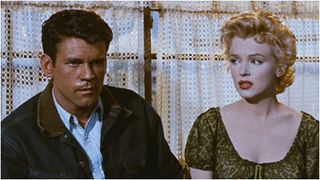
Where Chérie is pushed and pulled around with no agency, Monroe was, at the time, on the opposite trajectory. Despite branching out into other genres earlier in her career, playing the femme fatale in 1953's Niagara and appearing in noirs Don't Bother to Knock (1952) and The Asphalt Jungle (1950), by '54, 20th Century Fox was determined to keep her pigeonholed in the airy, comedic roles she was so adept at playing. This didn't work for Monroe, who was intent on being taken seriously as an actor. Her contract at Fox had her underpaid, with no say in what she appeared in. She refused to film the comedy The Girl in the Pink Tights, so Fox suspended her. A resolution seemed to have been reached when Monroe agreed to play a supporting role in 1954's There’s No Business Like Show Business and star in Billy Wilder's The Seven Year Itch (complete with a hefty bonus) – but the battle was far from over.
In a move that has been credited with toppling the old studio system, Monroe and photographer Milton Greene formed Marilyn Monroe Productions (MMP) in late '54, with Monroe herself as president. Later, during a press conference announcing the news, Monroe made her ambitions clear: "I am tired of the same old sex roles. I want to do better things. People have scope, you know." It wasn't quite a coup de grâce, though, because there wasn't much MMP could do as the legal struggle with Fox continued. In the meantime, Monroe made her commitment to changing her image clear. She ditched her acting coach and took up classes at the prestigious NYC Actors Studio, which counts Marlon Brando, James Dean, and Jack Nicholson among its other notable alumni. She would not appear in Fox's next choice for her, a comedy called How to Be Very, Very Popular.
Eventually, Monroe proved to be too big a star to lose, and she got a new contract with Fox at the end of '55. It was a huge win, paying far better and giving her more control over her career, including approval over directors and her films' subjects. MMP's first picture would be Bus Stop, and before cameras rolled, its leading lady put the final stamp on her transformation with a legal name change from Norma Jeane Mortenson to Marilyn Monroe.
All change
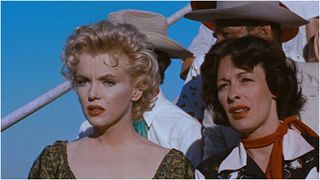
If Bus Stop had starred anyone else, it's doubtful the film would stand the test of time. Monroe disappears into her role, with her signature blonde hair dyed a darker shade, her famous low, breathy voice exchanged for a high-pitched Ozark accent, her skin tone made chalky with makeup (Chérie works nights and hardly sees the sun), her singing warbly, and her dancing awkward – just contrast her faltering performance of the film's "That Old Black Magic" with Gentlemen Prefer Blondes' knockout "Diamonds Are a Girl's Best Friend." Monroe even found her own bedraggled costume, turning down one she thought looked too polished, and putting her own holes into her fishnets. Behind the scenes, she worked busily with her acting coach Paula Strasberg to perfect her performance, painstakingly going over every line of every scene, often long into the night.
Sign up for the Total Film Newsletter
Bringing all the latest movie news, features, and reviews to your inbox
The hard work paid off. Director Joshua Logan, who before the cameras rolled protested that "Marilyn can’t act!", was entirely won over, going so far as to call her "one of the great talents of all time." The New York Time's review mirrored his about-face: "Marilyn Monroe has finally proved herself an actress in Bus Stop. She and the picture are swell! This piece of professional information may seem both implausible and absurd to those who have gauged the lady's talents by her performances in such films as Niagara, Gentlemen Prefer Blondes and even The Seven Year Itch, wherein her magnetism was put forth by other qualities than her histrionic skill."
The legacy
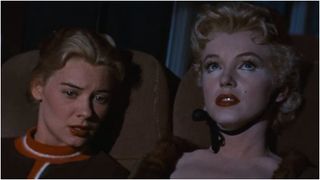
By modern standards, Chérie's storyline is entirely misogynistic. It's disturbing to watch her give in to Beau's advances because he's asked for the first time if he can kiss her, and because he's the first person to accept her history with other men (apparently, it "averages out" because he has never had a girlfriend). Beau's "I like you the way you are, so what do I care how you got that way" would be sweet if not for all the time he's spent harassing – and literally abducting – Chérie, his inability to even pronounce her name right, and the fact that her transgression in his eyes is having been with other men. "That's the sweetest, tenderest thing anyone's ever said to me," Chérie replies, which is nothing but horrifying.
That doesn't mean that Chérie is a character undeserving of Monroe's talents, though. There's something tragic in her speech on the bus about wanting whoever she marries to have "some real regard for me," as well as her dreams of making it to Hollywood when her talents aren't quite up to scratch. It's ironic that Chérie is mapping her way to stardom right after Monroe deliberately spent so long away from the spotlight.

We'll never know if this career turning point would have continued to lead Monroe to greater heights. She sadly only appeared in four more films before her untimely death in 1962 (leaving a fifth, Something's Got to Give, unfinished). There is evidence, though, that the upward arc was holding strong: in '57 Monroe starred with the legendary Laurence Olivier in MMP's only other film, The Prince and the Showgirl, then reunited with Wilder to dazzle opposite Jack Lemmon and Tony Curtis in the beloved Some Like It Hot. While Let's Make Love fell flat, and wasn't particularly liked by Monroe, she again proved her prowess as Roslyn in her final film, The Misfits – potentially her only performance to rival Bus Stop.
"It's no challenge to do the same thing over and over. I want to keep growing as a person and as an actress," Monroe once said. With Bus Stop, she finally managed just that – so while that enduring image of a red-lipped Monroe smiling in a pure white dress won't (and shouldn't) fade, the shabbier Chérie should be part of that picture, too.
To see all the major films headed your way this year, check out our guide to all of 2021's upcoming movie release dates.

I'm a Senior Entertainment Writer here at 12DOVE, covering all things film and TV for the site's Total Film and SFX sections. I previously worked on the Disney magazines team at Immediate Media, and also wrote on the CBeebies, MEGA!, and Star Wars Galaxy titles after graduating with a BA in English.
Most Popular





